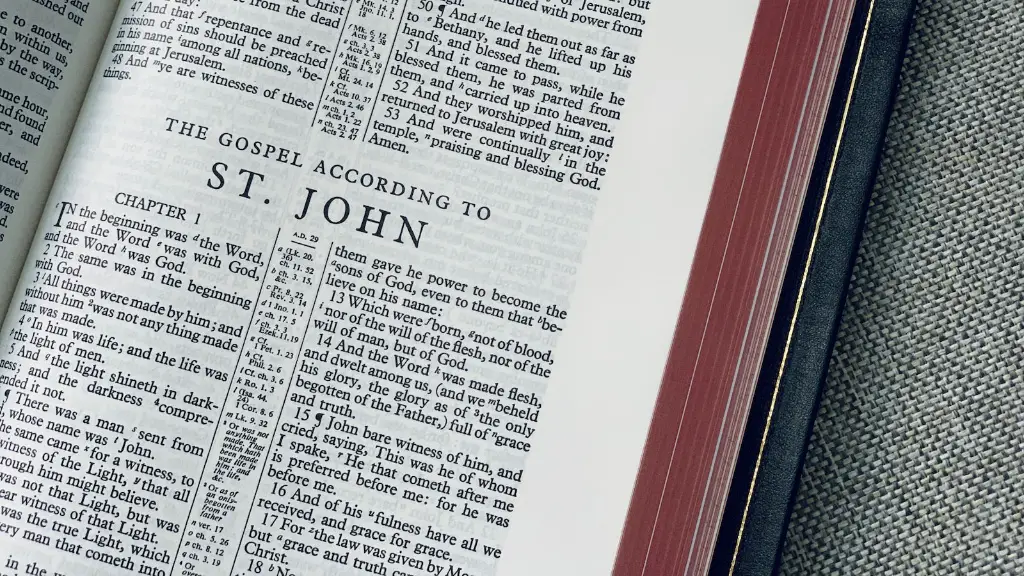The Bible is filled with stories of love, hope and unity, but it also has clear messages about hatred. The Bible doesn’t shy away from the fact that hatred is a real and relevant emotion that has an impact on people’s lives. In fact, the Bible speaks out against hatred in multiple passages, emphasizing that it can be destructive force in our lives.
In the Old Testament, Proverbs 10:12 reads, “Hatred stirs up dissension, but love covers over all wrongs.” The Bible is full of scriptures that encourage us to be filled with love instead of hatred. Jesus taught us to love our enemies, to love those who hurt us, and to forgive those who wrong us, and do not harbour feelings of hatred in our hearts (Matthew 5:44).
The New Testament also speaks strongly against hatred. In I Corinthians 13:4-5, it reads, “Love is patient, love is kind. It does not envy, it does not boast, it is not proud. It does not dishonour others, it is not self-seeking, it is not easily angered, it keeps no record of wrongs.” This passage echoes the Old Testament message of compassion and understanding, and serves as a reminder that hatred is a destructive force that can be overcome by love.
The Bible also speaks out against the idea that hatred is too powerful to conquer. In James 4:7, it reads, “Submit yourselves, then to God. Resist the devil, and he will flee from you.” This passage reminds us that even when we are tempted to hate, we can have the strength to resist it from the power of God. Ultimately, the Bible teaches us that hatred isn’t something we should indulge in, but something we can rise above.
Hatred also has a strong impact on relationships with others. The Bible warns us about the potential for hatred to damage our relationships, with Proverbs 10:12 reading, “Hatred stirs up dissension, but love covers over all wrongs.” The Bible teaches us to forgive others when they hurt us, and not to let hatred fester in our hearts. This can be easier said than done, but the Bible offers us an understanding of the power of love to heal instead of resentment and hatred.
The Bible’s message is clear- hatred is a destructive force and is something we should distance ourselves from. It can damage our relationships with other people, and can even lead to serious physical harm. Rather than indulging in hatred, the Bible teaches us to focus on love, forgiveness, and understanding. Ultimately, the Bible teaches us that hatred is no match for the power of God’s love.
Ignoring Hatred
The Bible also calls us to ignore hatred, even if it is directed at us. In Romans 12:14, it reads, “Bless those who persecute you; bless and do not curse.” This passage emphasizes that we should bless those who have hurt us, instead of engaging in a cycle of hatred. The Bible teaches us to respond to hatred with love, and to use our words to spread peace instead of anger.
The biblical accounts of Joseph and Jesus’ crucifixion also speak to this idea. In both instances, those who had persecuted and wronged them chose to forgive, rather than to hate. Forgiveness is an act of strength and courage, and the Bible encourages us to do the same if we find ourselves in positions of hurt or betrayal.
It’s important to remember that we can’t always control how other people treat us, but we can decide how we respond. The Bible speaks to this idea, with Matthew 7:12 reading, “So in everything, do to others what you would have them do to you, for this sums up the Law and the Prophets.” Following this guideline can be difficult, but it teaches us to respond to hatred with kindness and love.
It’s natural to feel angry or hurt when we’ve been wronged, but the Bible tells us to take the higher ground and show compassion instead of hatred. We don’t have to be a part of the cycle of hatred that is so prevalent in our world. By standing firm in the truth of the Bible, we can choose to turn the other cheek and live a life of love, instead of hatred.
The Power of Forgiveness
The Bible also speaks to the power of forgiveness. In Matthew 6:15, it reads, “If you do not forgive others, your Father will not forgive your sins.” This passage emphasizes that refusal to forgive is sin. Jesus showed us the ultimate example of love and forgiveness when he sacrificed his life for us, despite knowing the depth of hatred in the hearts of those around him.
In addition, the Bible tells us that we should forgive ourselves. In Isaiah 43:25, it reads, “I, even I, am he who blots out your transgressions, for my own sake, and remembers your sins no more.” This passage speaks to the power of mercy and grace that God offers us. We can choose to accept his forgiveness and also to forgive ourselves.
Hatred is a destructive force, and we shouldn’t let it become part of our lives. Forgiveness is the key to releasing ourselves from the chains of hatred, and it’s a powerful tool that the Bible teaches us to embrace. Forgiveness can lead to greater understanding and peace, and it’s an essential part of the gospel. By abiding by the teachings of the Bible, we can choose to forgive those who have wronged us, and be free from the grip of hatred.
The Power of Love
The Bible emphasizes that the power of love is greater than the power of hatred. In I John 4:8, it reads, “Whoever does not love does not know God, because God is love.” This passage reminds us that God loves us and acts out of a place of love, not hatred. As followers of God, we are called to do the same and put love above hatred.
We can’t always control how people treat us, but we can choose how we react. Rather than responding to hatred with hatred, the Bible calls us to love those who hate us, and to forgive those who wrong us. This is no small feat, and it’s one that the Bible speaks to frequently. The Bible offers us an understanding of the power of love, and calls us to demonstrate our love for others even when we feel hurt and wronged.
It’s easy to fall prey to the temptation of hatred, but the Bible calls us to respond to hatred with love. Selfless love is a powerful force, and it’s one that can overcome even the darkest moments in life. By following the teaching of the Bible, we can choose to show compassion when faced with hatred, and to demonstrate the power of God’s love.
Moving Forward with Love
The Bible calls us to move forward in life with love instead of hatred. In I Corinthians 16:14, it reads, ”Let all that you do be done in love.” This verse reminds us that we should act out of a place of love, and focus on uplifting and serving others.The Bible encourages us to focus on loving our neighbour, and to look to God for guidance on how to respond to hatred.
As followers of Jesus, we’re called to live a life of compassion, understanding, and love. We can reject hatred when it arises, and choose to respond to it with patience, grace, and mercy. The Bible is filled with stories of love and redemption, and it encourages us to look to God for strength when faced with hatred.
Ultimately, the Bible calls us to love our neighbour as we love ourselves. We can’t control how people choose to act, but we can decide how we react. In a world full of hatred, the Bible calls us to demonstrate the power of God’s love in all that we do. By choosing to reject hatred and to embrace love, we can demonstrate the power of God and move forward on a path of righteousness.
Demonstrating God’s Love
The Bible also speaks to the idea of demonstrating God’s love. In Romans 12:9-10, it reads, “Love must be sincere. Hate what is evil; cling to what is good. Be devoted to one another in brotherly love.” This passage calls us to demonstrate love to others, even those who have hurt us. We can’t control the way people choose to act, but we can choose to respond with understanding and compassion.
The biblical accounts of Joseph, Jesus, and Paul all speak to the power of love in the face of hatred. Despite being wronged and hurt, they chose to love and forgive, demonstrating a level of selflessness that was humbling and powerful. By following the example of Jesus and other biblical figures, we can choose to respond to hatred with love.
The Bible also speaks to the idea that we can spread God’s love even when faced with hatred. In II Corinthians 10:3-5, it reads, “For though we live in the world, we do not wage war as the world does. The weapons we fight with are not the weapons of the world. On the contrary, they have divine power to demolish strongholds. We demolish arguments and every pretension that sets itself up against the knowledge of God, and we take captive every thought to make it obedient to Christ.” This passage reminds us that even when faced with hatred, we can choose to take captive our thoughts and focus on the power of God’s love.
The Bible speaks of the power of love over hatred. It calls us to demonstrate God’s love, even in the face of hatred. We can’t control how people act towards us, but we can choose how we respond. By putting God’s love above all else, we can reject hatred and embrace love, following the example of biblical figures and living a life of righteousness.





